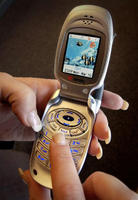 I have a bet going with myself: will every single film I see have a moment that relies on cell phone conversations to move story? So far, only a few films like Water have been lacking because they are set in bygone eras. Until now I thought only voiceover narration could make me clutch my head through overuse, or bad use, but I have a new enemy!! The endlessly chirping, rattling, buzzing, singing, mobile phones of moviedom!!! As if it weren't bad enough to deal with them in life, now we get to endure it on screen as well. Apparently, no one in the world is unwired.
I have a bet going with myself: will every single film I see have a moment that relies on cell phone conversations to move story? So far, only a few films like Water have been lacking because they are set in bygone eras. Until now I thought only voiceover narration could make me clutch my head through overuse, or bad use, but I have a new enemy!! The endlessly chirping, rattling, buzzing, singing, mobile phones of moviedom!!! As if it weren't bad enough to deal with them in life, now we get to endure it on screen as well. Apparently, no one in the world is unwired.In Elizabethtown, Orlando Bloom and Kirsten Dunst fall in love over their cell phones and turn them off only when standing face to face. "Shall we hang up now?", she says. Yes!, I screamed within. In Francois Ozon's powerfully moving Le Temps Qui Reste, the character resolves key relationships in phone messages. Even Iron Island, the beautiful Iranian film about homeless folks living on an abandoned tanker involved scenes where chadorred women lined up to use a mobile. What does it say about global culture that cinematic families who sleep in the same room with their goats expect to use wireless technology during the average day?
 In the industry screenings, audience members are blackberrying, texting, looking lovingly at photos or simply playing solitaire when they are bored and while the movie is still showing. In life, in movie theatres, and on screen, it has become a way of avoiding courtesy and respect, and worse, minimizing or obscuring vital connections with others in which those rarities - nuance, and subtlety - occur, impossible to convey merely through voice. On film, the face is 30 feet wide. Why must it be talking on a phone?
In the industry screenings, audience members are blackberrying, texting, looking lovingly at photos or simply playing solitaire when they are bored and while the movie is still showing. In life, in movie theatres, and on screen, it has become a way of avoiding courtesy and respect, and worse, minimizing or obscuring vital connections with others in which those rarities - nuance, and subtlety - occur, impossible to convey merely through voice. On film, the face is 30 feet wide. Why must it be talking on a phone?Cell phones on screen do at least liberate the cinema phone - allowing us to make calls more visual by taking conversations into any part of the world, any conceivable environment. But is this a good thing really in the long run? Cell phones a fast story cure, a way to get from point a to point b without thinking more actively. Characters used to be more physically motivated - they experienced a gamut of emotions that forced them into active choices. They ran down streets at top speed, crossed deserts, trekked through wilderness, to be reconciled with loved ones. Now they just flip open their Nokia. Less dialogue is always more, and even less on the phone is ideal. Will I win or lose the bet? We'll see!
1 comment:
Hey Bib! Always great to hear from you - I miss you. But I'm coming home today. I agree with your conclusion but don't think it's great for cinema. I think we now have to learn to make it like anything else, and deeply considered, instead of just widely pervasive. It has to be there for a reason, just like all other dramatic elements.
I note for instance, that in Etre Sock Puppet, there is not one cellular device - a superior choice I feel.
Post a Comment